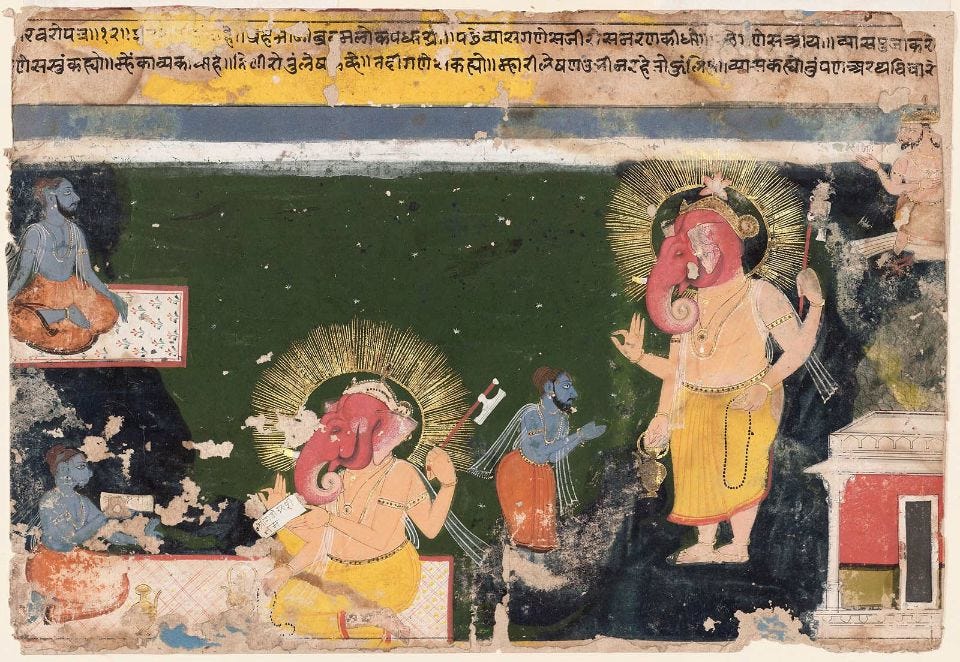Jayary Newsletter # 51

More Possibilities
I am suggesting that we abandon our search for philosophical principles and focus more on an elemental list of stories, the idea being that a storehouse of alternatives is better than a single alternative.
If you're reading carefully, you might say: isn't the storehouse of stories just an alternative way of saying "the underlying principle of stories," and if so, aren't we back to the task of principle discovery?
In fact, that's a move which has yielded much insight in the last fifty years. I am thinking of Chomsky's approach to language, which first postulates a storehouse of language - he calls it the language organ - and then proceeds to discover the principles underlying the storehouse - he calls it the universal grammar.
I am taking a different route - in my view, the analogy to design and architecture leads to a better foundation for our storehouse than the discovery of universal principles, but it's going to take me to far afield to defend that claim right now. Indeed, setting aside its content, the frame of the Jaya is very much an architectural achievement, with a major story serving as the skeleton for the minor stories. If all goes well, I will articulate that position in detail in the second summary period at the end of this year.
Let me now turn to one particular topic where the Jaya has much to contribute: violence.
Violent Dreams #1
As an apex predator, humans haven't been preyed upon for a very long time. In fact, the only place where we are still threatened by monsters are in dreams and stories. It's true that people still die of snake-bite and bee-stings but the numbers are trivial compared to our population. Even hunter-gatherers, with all the dangers of being gored by a cornered bull or wayward arrow, aren't looking out for a tiger or lion every minute of their lives.
We can still experience fear in the wild - try camping amongst the grizzly bears in Alaska and you'll know the different between cute and terrifying - but it's a boutique experience; in the future, bored rich people will pay a lot of money to an Inuit community for the pleasure of being eaten by the last surviving polar bear.
In settled human society, i.e., life for most of us for all of history, the real danger from the natural world is disease, not predation. We are no longer worried about lions but avian flu might kill us all. About twenty thousand people died of snake-bite in 2015. In contrast, more than half a million people died of malaria alone and another two hundred million were infected. Germs are our real competition, but they don't populate our dreams. Why not?
Violent Dreams #2
I have this theory - maybe it's just a myth I am making up right now- that the end of predation is also the beginning of history; time stops flowing continuously and is now marked by events, rituals and sacrifices. We become a people and celebrate our superiority over nature by constructing a lineage for ourselves. So in this myth, human history starts and natural history ends when we are no longer food.
We so take our supremacy for granted that it's not even worth remarking; there's no need to celebrate our victory over a bear king or the final decimation of monkey empire. From blue whales to bald eagles, animals are a source of fascination, of romantic celebration and targets of disdain and unremitting cruelty, but they're no longer our enemies.
That's where we are in history today, but the Jaya still retains the animal past; back in the jungle, it was possible for a lost pilgrim to be devoured by wolves. At the same time, the Jaya also decisively signals a human future. Our lordship over the earth is taken for granted, and in turn, the lordship of kings over us is taken for granted. It's in that spirit that I read the Jaya, with its recounting of the Ikshavaku lineage at the very beginning.
Violent Dreams #3
Having discovered history, we are trapped by it. History flatters us, it separates us from those beasts we domesticate for work and pleasure, but it demands worship from us in return. How else can we prove that we are human, that we truly exist?
The minute we stop worshipping history, we slip back into animality. Many years later, when Europeans colonized the rest of the world in the name of a different god of history, they looked down upon everyone else in that very fashion while claiming to bring civilization to the rest of us. In the future, when some humans merge with computers, they will condemn the rest as worse than beasts.
We haven't reached that stage of history in the Jaya yet. For now, we are happy worshipping it in two forms: as our ancestors and as our gods.
Here's one theory of violence: bloodshed is inevitable whenever we stop worshipping history, i.e., by not sacrificing to the gods and not pleasing our ancestors by having children. When Jaratkaru is assailed by his ancestors for not having children, he's accused of breaking two pacts: a biological pact that every creature makes with its progeny and a historical pact that humans make with their predecessors. The two are related, but they aren't the same.


